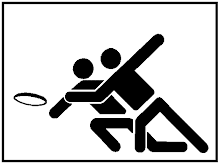InFocus Films creation of the Pianist poster uses the ethos and pathos that many feel surrounding the events of the holocaust. The average passerby probably would not grasp that this poster represents a movie about the holocaust but, this poster is not directed at the teenagers looking for a big explosion and fast cars. The simplistic style of the poster makes it so every detail must represent something. The delicate hands hanging over the piano suggest a soft and irenic feeling that which is in complete juxtaposition with the events of the holocaust, while the barely visible Star of David arm patch in the top left corner is what really needs to be witnessed until a viewer would understand that this film was about the holocaust, if not being told beforehand.
Though the picture draws in the viewer initially the small print in the center that says: "Music was his passion, Survival was his masterpiece", is what really leaves the viewer feeling compelled to see this movie. That small line is where InFocus Films utilizes pathos and ethos to hopefully get a movie goer in their seats.
Too many music is considered a passion. A passion that to many it doesn't need to be explained or reasoned, because for them it helps control or release their raw emotions. The statement "music is a passion" can almost be agreed upon by all. This line creates a connection with the viewer and suggests that the main character and the viewer might actually share something in common, to where the poster gazer might want to now see the movie. The next line "Survival was his masterpiece" is where the struggle in the movie is previewed and gives the onlooker a possible storyline to create in his head.
InFocus understanding that the passerby that stopped to examine this poster is probably older can also assume that their logic is also more inclined. With the several symbols presented in this poster along with the powerful statement in the center a logical person should be able to develop a close guess to what this film is about, and that's exactly what InFocus wants the viewer to do. With the viewer creating an idea of what this poster is about they already feel more inclined to see it because now they have to know if they are right. This is probably more subconscious but true none the less because it's human nature to feel good and accomplished when you discover your right.
Though the picture draws in the viewer initially the small print in the center that says: "Music was his passion, Survival was his masterpiece", is what really leaves the viewer feeling compelled to see this movie. That small line is where InFocus Films utilizes pathos and ethos to hopefully get a movie goer in their seats.
Too many music is considered a passion. A passion that to many it doesn't need to be explained or reasoned, because for them it helps control or release their raw emotions. The statement "music is a passion" can almost be agreed upon by all. This line creates a connection with the viewer and suggests that the main character and the viewer might actually share something in common, to where the poster gazer might want to now see the movie. The next line "Survival was his masterpiece" is where the struggle in the movie is previewed and gives the onlooker a possible storyline to create in his head.
InFocus understanding that the passerby that stopped to examine this poster is probably older can also assume that their logic is also more inclined. With the several symbols presented in this poster along with the powerful statement in the center a logical person should be able to develop a close guess to what this film is about, and that's exactly what InFocus wants the viewer to do. With the viewer creating an idea of what this poster is about they already feel more inclined to see it because now they have to know if they are right. This is probably more subconscious but true none the less because it's human nature to feel good and accomplished when you discover your right.
